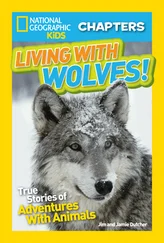Shirley, my mother, had given birth to me at the age of twenty-four, knowing that she would have to bring me up alone and unsupported. At that time and in that sort of tight-knit community, to have a child out of wedlock was extraordinarily brave, but her parents were apparently very supportive. Sadly, I don’t know the story; I don’t know whether she was in love with someone who was unattainable for some reason. I don’t even know whether my father knew I existed. All I know is that she never had or wanted another partner. So I don’t know who my father was. Even now, forty-five years later, my mother won’t talk about it.
My guess is he was a Romany—not to be confused with the tinkers and travelers who have given gypsies such a bad name over the years. The gypsies we knew were wonderful people, scrupulously clean and honest, with a very strong sense of family and strict codes of morality. They used to travel about the countryside in their traditional prettily painted wooden wagons, drawn by horses, going wherever there was work. They would pick hops and fruit in Kent and vegetables and soft fruit in Norfolk. Occasionally they would graze their horses on the village green, but they had a permanent site on a piece of common land just outside the village, next to an old Roman road called Peddars Way.
Every summer I used to go and play with them. We would go out with the dogs and catch rabbits while the farm workers were combining. They had lots of dogs, big lurchers. One in particular, I remember, was called Scruff; he was crossed with a wolfhound, so huge, and he would chase rabbits until he dropped.
A little farther up the Way was a wagon set on its own that belonged to an old gypsy woman who, it was said, bought illnesses. She was very old and wizened, with long gray hair and gold hoop earrings, and looked like the old-fashioned gypsies you see in picture books. People who were ill used to go to see her. I don’t know whether she made them better, but I don’t imagine anyone would have dared say if she hadn’t because it was said she would put a curse on anyone who spoke ill of her.
I felt very much at home with the gypsies, and although she never said anything, I have a strong feeling that my mother was pleased. I think, in retrospect, that she may have been trying to introduce me to my father’s family. It was unusual for village children to mix with gypsies. They were never liked by the village people and were made to feel distinctly unwelcome in the shops and pubs. I knew how it felt to be treated like an outcast.
I was a solitary child. I attended the little primary school in Great Massingham until the age of eleven, but I don’t remember many friends from that time although I must have had the odd one because I do remember throwing sticks into the horse chestnut tree in the churchyard to get conkers and being told off by the vicar—and I don’t imagine I’d have been doing that alone. But with no father, I think I may have been viewed as a bit of an outcast myself. Maybe I felt I didn’t need friends; I had Whiskey and the farm dogs and they were much easier than my peers. Dogs don’t pick fights or bully or make unkind remarks.
Not that I had much time for friends. I always had to hurry home after school to chop wood for the fires or bring in coal or feed the animals, and I was often taken out of school for several weeks at a time to help with the harvest or whatever farmwork needed to be done. The school never seemed to mind my absence—I was never going to be top of the class, and I wasn’t the only child at the school who was taken out to work on the land at busy times. The teachers seemed to focus on those children who obviously had an academic future and didn’t pay too much attention to the rest of us. And so I worked hard at the subjects I enjoyed, which apart from art were animal related—biology and other sciences—and sports. Those were things I really could do and I was in all the teams for soccer and rugby and cricket. I loved anything played with a ball or anything athletic.
I also loved fishing. In the village there were three big ponds we used to fish. One of them dried out one summer and we rescued the fish in buckets and ran to put them into the other ponds before they died. North Norfolk has dozens of little ponds, or “pits,” as they were called, often in the middle of fields, with tall trees surrounding them. It was a curious feature of the landscape in that part of the county. There were all sorts of theories about how they came to be there. Some people said they were craters caused by German bombs dropped during the Second World War; others said they were left over from some sort of mineral excavation. Whatever caused them, they were full of fish, such as carp, roach, pike, and bream, and provided hours of entertainment for children like me.
Sometimes we would fish farther afield. One pit we were particularly fond of was in a field by the side of the road about four miles from Great Massingham. It was full of gold-colored fish, but every time we got ourselves set up, the farmer would come running out of the farmyard across the field, shouting angrily and waving a stick at us, and we would leap on our bicycles and race away.
I had a green Chopper, which was just the coolest bike at that time. I think my grandfather must have found it on some rubbish pile. It looked as though it had been run over by a steamroller and was all rusty but he restored it for me, painted it, found it a new seat, and it became my prize possession.
A doctor’s surgery was the only facility missing from the village. It was a two-and-a-half-mile walk away, in the village of Harpley, where Dr. Bowden had his practice. It was a route I knew well. I was seldom ill but I was accident prone and often needed to be stitched up after bad falls or being bashed during soccer and rugby games.
I didn’t care for doctors much, but dentists I loathed with a passion. I have only been to a dentist once in my life, for a checkup when I was about eleven at a practice in Fakenham, a town about twelve miles away. The dentist said I needed a back tooth removed and although he gave me a local anesthetic, I have never felt pain like it. He had his knee on my chest as he wrestled to pull out that tooth. It was the most horrific experience. I couldn’t bear it. I hated the smell, I hated the noise, I hated the injection, and I couldn’t stand the pain. I vowed I would never go near a dentist again, and I haven’t. On the positive side, it did make me clean my teeth properly and the only teeth I’ve lost since then have been knocked out by overboisterous wolves.
Hospitals have been less easy to avoid. I fell through a roof in my late teens and broke a wrist, and I went through a car windshield soon after I learned to drive, but my first hospital stay was at the age of nine. I lost my grip on the school climbing frame and fell onto the hard ground beneath, shattering an elbow. I was rushed to the hospital in King’s Lynn, where I languished in the children’s ward with my arm suspended above my head for three weeks. There was a boy in the next bed who had slipped and fallen under the wheels of a double-decker bus.
I have no memory of my mother’s visiting, but she tells me that she gave up work for those three weeks and took the bus early every morning into King’s Lynn, which was fifteen miles away, to sit by my bedside until early evening, when she took the bus home again.
One day the sister in charge of the ward came up to her and said, “You’ve been coming here every day for nearly three weeks and I have never seen you have anything to eat. Today you are going to have some lunch. I have organized it with the kitchen.” The sister had rightly surmised that having been off work all that time, with no wage coming in, my mother couldn’t afford to feed herself.
Читать дальше












